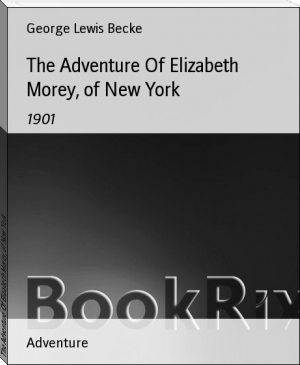Ridan The Devil And Other Stories by George Lewis Becke (free e books to read .TXT) 📕

Read free book «Ridan The Devil And Other Stories by George Lewis Becke (free e books to read .TXT) 📕» - read online or download for free at americanlibrarybooks.com
- Author: George Lewis Becke
Read book online «Ridan The Devil And Other Stories by George Lewis Becke (free e books to read .TXT) 📕». Author - George Lewis Becke
In conclusion, let me advise anyone who is contemplating a visit to Australia, and means to devote any of his time to either river or lake fishing, to take his rods with him; all the rest of his tackle he can buy as cheap in the colonies as he can in England. Rods are but little used in salt-water fishing in Australia, and are terribly expensive to buy. Those who do use a rod are usually satisfied with a bamboo--a very good rod it makes, too, although inconvenient to carry when travelling--but the generality of people use hand lines. And the visitor must not be persuaded that he can get really good river fishing without going some distance from Sydney or Melbourne. That there is some excellent sport to be obtained in Port Jackson in summer is true, but it is lacking in a very essential thing--the quietude that is dear to the heart of every true fisherman.
THE WRECK OF THE LEONORA: A MEMORY OF 'BULLY' HAYES
The brig _Leonora_, owned and commanded by the notorious Captain 'Bully' Hayes, has, perhaps, been more written and talked about than any other vessel, except the _Bounty_, that ever sailed the South Seas, and her career was as eventful as that of her captain. It was my fortune to fill the distinguished position of supercargo to that eminent gentleman for two years, and, as may be imagined by those who have read anything of Hayes's strange life and doings in the Pacific and the China Seas, I found the berth a remarkably curious one. How and why I became supercargo to the famous alleged pirate is another story; but, in justice to 'Bully's' memory, I may here at once say that the man was _not_ the remorseless ruffian that his enemies and many writers of tales of the South Seas have painted him; furthermore, he was one of the best sailor-men that ever trod a deck. Had he lived in the times of Drake or Dampier, he would have been a hero, for he was a man born to command and lead. _Inter alia_, he was also clever with his fists, and my soul was possessed of the deepest admiration for him in this respect from the very first day I stepped on board the _Leonora_, in Milli Lagoon, in the Marshall Islands, for it was my privilege to see him knock out three men, one after another, in twice as many minutes. These men were 'toughs' from a New Bedford whaler, and had been put ashore at Milli Lagoon by their captain as dangerous and useless characters. They came on board the _Leonora_ and asked 'Bully' to ship them. He refused in such unnecessary language that the leader of the three, in fatuous ignorance of the man to whom he was speaking, threatened to 'put a head on him'; whereupon Hayes at once had the deck cleared, and, taking them in turn, knocked each man out in the first round. Then he gave them a glass of grog all round, a bottle of arnica to cure the malformations he had caused on their countenances, and sent them ashore.
But this is not the story of the wreck of the _Leonora_.
We had made Strong's Island from Ponape, in the Western Carolines, to wood and water and land some cattle, and for two weeks we lay at anchor in the beautiful harbour of Lele. We found the island in a very disturbed and excited state, for a few weeks previously two American sperm whalers had touched at Lele and landed five white men, with a retinue of nearly one hundred savage natives from Pleasant Island, an isolated spot situated in 0.25 S., and these people--white and brown--so terrified the Strong's Islanders that the old King Togusa was in abject fear of them. We (Hayes and myself) soon learnt their story, which was that they had been compelled to fly for their lives from Pleasant Island on account of an engagement between the various clans of that place. The two chiefs under whose protection these men lived had been badly beaten, and the victors gave the five white traders a short notice to clear out or be shot. They at once put to sea in their several whale-boats, but when some three hundred miles away from the island, on their way to Ponape--the North Pacific Cave of Adullam--they were sighted and picked up by the two whalers, the _St George_ and the _Europa_, the captains of which, not caring for their company all the way to Ponape, landed them at Strong's Island. They were now awaiting a chance to continue their voyage to Ponape in a passing whaler, and in the meantime their savage followers were harrying the unfortunate Strong's Islanders to death, robbing their plantations, abducting their women and knocking them about generally.
These wild people were the most noisy and intractable lot of natives I had ever seen, wearing only a girdle of leaves around their waists, and all armed with Snider carbines and short stabbing knives made from cutlasses broken in halves. But, although they bullied the weak and effeminate Strong's Islanders, they were yet very obedient to their white masters, to whom they were all more or less related through the native wives whom the traders had married. The women were very tall and handsome, and every bit as handy with their knives as the men in a quarrel.
Hayes, of course, was well known to both the white men and natives, and at once began his good offices by threatening to open fire on the houses and boats of the former if they did not at once cease to persecute the king and his subjects. This threat he made in the presence and hearing of the king himself, who was deeply grateful, and at once said he would make him a present of two tuns of oil. The five hairy ruffians were considerably startled at first; but Hayes, I regret to say, turning to one of them, named Pedro Diaz, said in Spanish, 'Don't be scared, Peter. I'm not going back on you fellows; but at the same time you'll have to quit knocking these poor devils about. So just go ashore and take away your people's rifles--it means a couple of tuns of oil for me--its just as well in the hold of the _Leonora_ as in that of the missionary brig _Morning Star_. The missionaries would only promise King Togusa credit in heaven. I'll give him enough grog to keep him drunk for a month of Sundays on earth; and as he never possibly could get to heaven, I am treating him better than the missionaries, who would simply be obtaining his oil under false pretences.'
On the following day the king sent off his gift of oil; the five white men and he became reconciled, and the abducted Strong's Island women were returned to their parents or husbands as a guarantee of good faith. In the evening the traders came on board and made an arrangement with Hayes to proceed in the brig to Arrecifos (Providence Island), a large atoll to the north-west, of which Hayes had taken possession. Here they were to live as long as they liked, paying Hayes a certain quantity of coco-nut oil as tribute, and resisting, by force of arms, any attempt to take possession of the atoll by the German trading company of Godeffroy, should it be made by any one of the three, armed German brigs belonging to the firm, and then cruising in the North Pacific.
Two days later we bade farewell to the old king and his pretty young wife, Se, and the _Leonora_ sailed out of Lele. We were first to call at South Harbour, six miles to leeward, where we were to take in yams, pigs and other provisions for the voyage to Providence Island, as we had now over one hundred additional people on board.
We ran out of Lele at daylight, and at seven o'clock in the morning dropped our anchor in fourteen fathoms in South Harbour, or Utwe,{*} as the natives called it. As quickly as possible the ship's boats, aided by those belonging to the traders, set to work to bring off the yams and pigs, for which, as they were brought on deck by their native owners, I weighed and paid. By dusk we had finished, and I was just dressing to go to supper aboard one of the American whale-ships which were lying near us, when the trade wind, which had been lusty enough all day, suddenly fell--a very dangerous sign at that season of the year. In a few minutes Hayes sent a boat over to the whalers, telling the captains that a blow was coming on from the westward, and advising them to clear out to sea. But the American captains decided not to risk towing out through the narrow passage; and as they were in a much better position than the _Leonora_, they did wisely, for in less than a quarter of an hour a mountainous swell began rolling in, and it soon became evident that even with our own four boats, and the seven belonging to the traders, we could not tow out.
* The Port Lottin of Dupurrcy.
As quickly as possible Hayes had our royal and top-gallant yards sent down, the boats slung in-board from the davits on the deck, the Pleasant Islanders sent below, and every preparation made to ride out the blow, which we were in hopes would not last more than six hours or so. So far not a breath of wind had come, but the brig was rolling so badly that we quite expected to see her go over on her beam ends and stay there. At sunset the air was so close and oppressive that one could scarcely breathe, and the natives in the hold became half suffocated, and could only be kept down by the white traders and some of our officers threatening to shoot the first man that tried to get on deck. Many of them, however, besought to be allowed to swim ashore and remain till morning, and Hayes told them they could go. Some ten men and six women at once came up; and, although it was now dark, and the sharks consequently much more to be dreaded, sprang overboard, and swam in towards the native village of Utwe.
For another twenty minutes or more we remained anxiously awaiting. The sky was as black as pitch, and there was now a tremendously high sea, and the din and thunder of the surf on the reef a couple of cables' length away was most appalling. I had never heard anything like it before, nor have I since; and the weird sound of the huge seas as they tumbled and roared upon the hollow crust of the reef made my hair stand upon end like priming wires. The tide was low, and perhaps that had something to do with the wild, resounding clamour of the seas upon the long line of reef; but there was a strange humming note underlying it all, which was new to many of our ship's company, and seemed to fill even the rest of the Pleasant Islanders who remained





Comments (0)